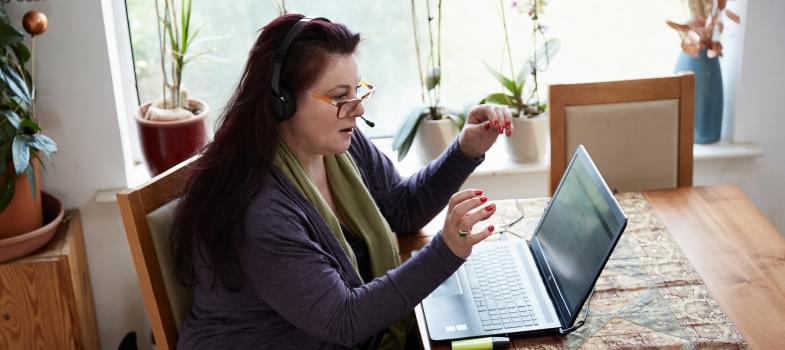1.3 Who are our students?
OU students are very diverse in age, previous educational qualifications and background, bringing a wealth of experience that enriches the student body. Our students are all part-time students, even though some may choose to study at full-time intensity. They are generally studying whilst juggling the demands of their busy lives. Students fit their study around their jobs, families and other commitments.
Our open admissions policy helps thousands of people who failed to achieve their potential earlier in life.
We are the largest provider of higher education for people with disabilities [Tip: hold Ctrl and click a link to open it in a new tab. (Hide tip)] .
Did you know?
The OU has more disabled students than any other university in Europe. The flexible nature of OU study and our experience in harnessing enabling technologies to support learning means over 24,000 people with a wide range of disabilities – including mental health issues – choose to study with us each year.
Learn some facts about OU students by answering the five questions below.
a.
43%
b.
76%
c.
61%
d.
89%
The correct answer is b.
a.
8%
b.
12%
c.
23%
d.
19%
The correct answer is c.
a.
42%
b.
34%
c.
26%
d.
38%
The correct answer is b.
a.
14,264
b.
18,689
c.
21,472
d.
24,709
The correct answer is d.
a.
62%
b.
42%
c.
32%
d.
52%
The correct answer is c.
The OU is the only UK university dedicated to distance learning, which means our students are not based on campus, the exception being that many of our postgraduate research students are based at the Milton Keynes campus.
The unique OU model of distance teaching is called “supported open learning”. You will learn about how this works in Part 3 Teaching methods and technologies of this course.
Our students are supported by tutors, also called Associate Lecturers (ALs). Tutors are not based on campus. They work remotely across the UK. Tutors make a vital contribution to the quality of teaching and learning, and support students by making contact at key points in their study, marking and providing feedback on assignments, helping students understand the module material and helping them prepare for their examination or end of module assessment
An associated role is that of practice tutor. Practice tutors have a broader role in relation to professional programmes such as degree apprenticeships. They have a particular responsibility for supporting the workplace aspects of degree apprenticeship students.
You will learn more about the different tutor roles in Part 4 Teaching in Computing and Communications of this course.
The tutor is generally the ‘face of the OU’ to their students. They are the first person a student will contact if they need help with their study. They will provide one-to-one support to the students in their tutor group. Tutors also run group tutorials either face to face or online.
1.2 What is the OU?


